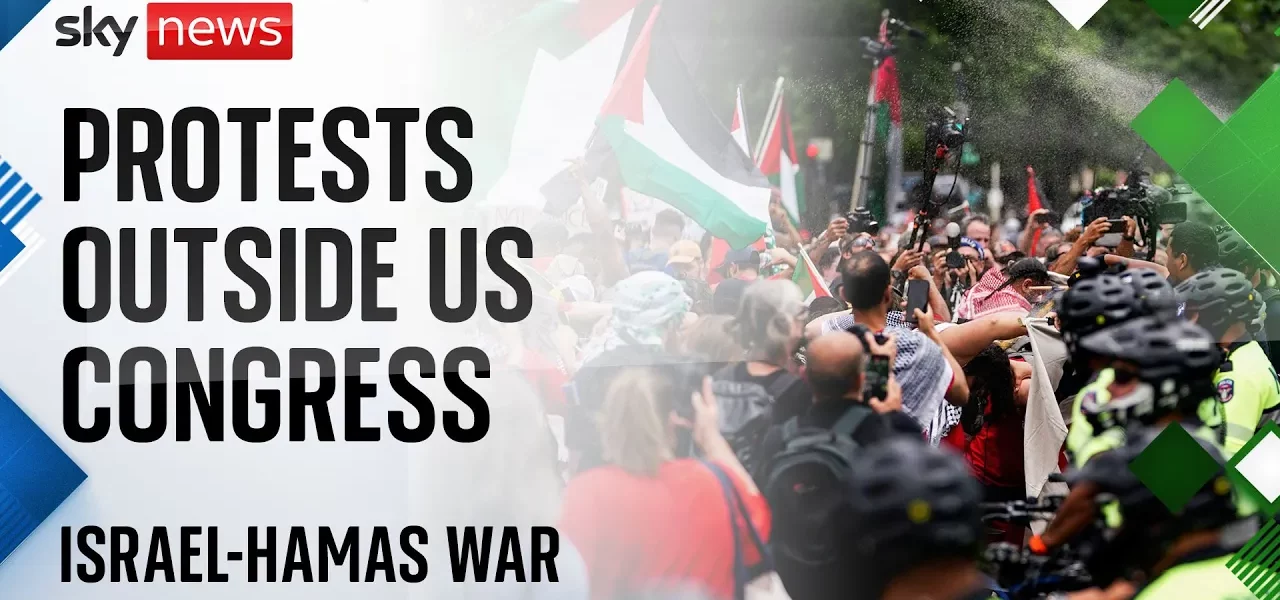Protests in Washington D.C. Against Netanyahu’s Address to Congress

This article delves into the recent protests in Washington D.C. surrounding Benjamin Netanyahu’s congressional address. It examines the political climate, public sentiment, and the broader implications for U.S.-Israel relations amidst ongoing tensions in the Middle East.
Introduction
The recent protests in Washington D.C. were ignited by the presence of Israeli Prime Minister Benjamin Netanyahu, who addressed Congress amid rising tensions in the Middle East. As the conflict continues to escalate, public sentiment in the United States reflects deep divisions over U.S. support for Israel and the ongoing humanitarian crisis in Gaza. This article will analyze the protests, the political context surrounding them, and the implications for future U.S.-Israel relations.
The Background of the Protests
The protests were primarily fueled by widespread anger towards Netanyahu’s government, particularly regarding its military actions in Gaza. Many demonstrators viewed his invitation to speak before Congress as an endorsement of policies they believe contribute to violence and suffering in the region.
Political Climate in the U.S.
The political landscape in the U.S. has become increasingly polarized regarding Israel. Protests have gained momentum as calls for a ceasefire and humanitarian aid to Gaza grow louder. Key factors influencing public opinion include:
- Escalation of violence in Gaza, resulting in significant civilian casualties.
- Perceptions of the U.S. government’s complicity in Israeli military actions.
- A rising awareness of humanitarian issues among younger generations.
Public Sentiment
The mood during the protests was predominantly one of anger and frustration. Many demonstrators expressed their feelings through placards and chants, directly targeting Netanyahu and U.S. foreign policy. The following themes emerged during the protests:
Condemnation of Netanyahu’s Policies
Protesters condemned Netanyahu’s government’s actions, characterizing them as war crimes. This sentiment was encapsulated in several slogans and posters:
- “Netanyahu is a war criminal!”
- “End U.S. aid to Israel!”
- “Peace for Palestine!”
Calls for Action
Many protesters demanded immediate action from the U.S. government, including:
- Ceasefire negotiations between Israel and Hamas.
- Increased humanitarian aid to Gaza.
- More accountability for U.S. military aid to Israel.
The Political Implications
Netanyahu’s address to Congress was not just a routine diplomatic visit; it carried significant political implications for both Israeli and American leaders. The reception of his speech varied markedly along party lines.
Responses from U.S. Lawmakers
While some Republican lawmakers applauded Netanyahu’s address, many Democrats chose to boycott the event, signaling a rift within the party regarding support for Israel. This division reflects broader societal trends and has potential electoral consequences for Democrats:
- Increased scrutiny of U.S. foreign policy in the Middle East.
- Potential shifts in voter sentiment leading up to upcoming elections.
Impact on Biden’s Administration
President Joe Biden faces a challenging situation. His administration must balance longstanding support for Israel with the growing calls for humanitarian assistance and accountability. Key challenges include:
- Maintaining bipartisan support amidst a shifting political landscape.
- Addressing the humanitarian crisis without alienating Israel.
- Striving for a lasting peace solution in the Middle East.
Conclusion
The protests against Benjamin Netanyahu’s address to Congress highlight the growing discontent among Americans regarding U.S. foreign policy in the Middle East. As tensions rise and humanitarian crises deepen, it is crucial for lawmakers to listen to their constituents and consider the broader implications of their actions. Moving forward, the path to peace in the Middle East may require not only political will but also a reevaluation of longstanding alliances. We encourage readers to stay informed and actively engage in discussions about these critical issues. For more insights, visit our related articles on U.S.-Israel Relations and Middle East Peace Efforts.
“`




